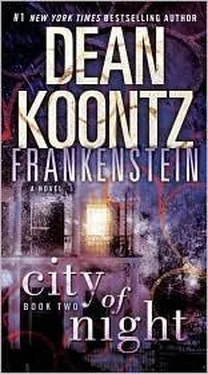They were, however, incapable of reproduction. The citizens of this brave new world would all be made in tanks, grown to adulthood and educated by direct-to-brain data downloading in four months.
Currently they were created a hundred at a time. Soon, tank farms would start turning them out by the thousands.
Their maker reserved all biological creation unto himself. He did not believe in families. Family relationships distracted people from the greater work of society as a whole, from achieving total triumph over nature and establishing utopia.
“What will the world be like without children?” Cindi wondered.
“More productive,” Benny said.
“Drab,” she said.
“More efficient.”
“Empty.”
Women of the New Race were designed and manufactured without a maternal instinct. They were supposed to have no desire to give birth. Something was wrong with Cindi. She envied the women of the Old Race for their free will, but she resented them most intensely for their ability to bring children into the world.
Another customer, an expectant mother, entered their aisle.
At first Cindi’s face brightened at the sight of the woman’s distended belly, but then darkened into a snarl of vicious jealousy.
Taking her arm, steering her toward another part of the store, Benny said, “Control yourself. People will notice. You look like you want to kill her.”
“I do.”
“Remember what you are.”
“Barren,” she said bitterly.
“Not that. An assassin. You can’t do your work if your face advertises your profession.”
“All right. Let go of my arm.”
“Calm down. Cool off.”
“I’m smiling.”
“It’s a stiff smile.”
She turned on her full dazzling wattage.
“That’s better,” he said.
Picking up a little pink sweater featuring colorful appliqued butterflies, displaying it for Benny, Cindi said, “Oh, isn’t this darling?”
“Darling,” he agreed. “But it would look better in blue.”
“I don’t see it in blue.”
“We really should be getting to work.”
“I want to look around here a little longer.”
“We’ve got a job to do,” he reminded her.
“And we have twenty-four hours to do it.”
“I want to decapitate one of them.”
“Of course you do. You always do. And we will. But first I want to find a really sweet little lacy suit or something.”
Cindi was defective. She desperately wanted a baby. She was disturbed.
Had Benny been certain that Victor would terminate Cindi and produce Cindi Two, he’d have reported her deviancy months previously. He worried, however, that Victor thought of them as a unit and would terminate Benny, as well.
He didn’t want to be switched off and buried in a landfill while Benny Two had all the fun.
If he had been like others of his kind, seething with rage and forbidden to express it in any satisfying fashion, Benny Lovewell would have been happy to be terminated. Termination would have been his only hope of peace.
But he was allowed to kill. He could torture, mutilate, and dismember. Unlike others of the New Race, Benny had something to live for.
“This is so cute,” said Cindi, fingering a sailor suit sized for a two-year-old.
Benny sighed. “Do you want to buy it?”
“Yes.”
At home they had a secret collection of garments for babies and toddlers. If any of the New Race ever discovered Cindi’s hoard of children’s clothes, she would have a lot of explaining to do.
“Okay,” he said. “Buy it quick, before someone sees us, and let’s get out of here.”
“After we finish with O’Connor and Maddison,” she said, “can we go home and try?”
By try , she meant “try to have a baby.”
They had been created sterile. Cindi had a vagina but no uterus. That reproductive space had been devoted to other organs unique to the New Race.
Sex between them could no more produce a baby than it could produce a grand piano.
Nevertheless, to appease her, to mollify her mood, Benny said, “Sure. We can try.”
“We’ll kill O’Connor and Maddison,” she said, “and cut them up as much as you want, do all those funny things you like to do, and then we’ll make a baby.”
She was insane, but he had to accept her as she was. If he could have killed her, he would have done it, but he could only kill those he was specifically directed to kill.
“That sounds good,” he said.
“We’ll be the first of our kind to conceive.”
“We’ll try.”
“I’ll be a wonderful mother.”
“Let’s buy the sailor suit and get out of here.”
“Maybe we’ll have twins.”
Erika had lunch alone in a dining room furnished to seat sixteen, in the presence of three million dollars’ worth of art, with a fresh arrangement of calla lilies and anthuriums on the table.
When she had finished, she went into the kitchen, where Christine stood at the sink, washing the breakfast dishes.
All food in this house was served on one pattern of Limoges or another, and Victor would not permit such fine china to be put in the dishwasher. All beverages were served in either Lalique or Waterford crystal, which also required hand washing.
If a dish sustained a scratch or if a glass was chipped, it must be discarded. Victor did not tolerate imperfection.
While certain machines were necessary and even beneficial, most of those invented to take the place of household servants were viewed by Victor with scorn. His standards of personal service had been formed in another century, when the lower classes had known how to attend, properly, the needs of their betters.
“Christine?”
“Yes, Mrs. Helios?”
“Don’t worry. I’m not going to discuss my sexual problems with you.”
“Very good, Mrs. Helios.”
“But I’m curious about a few things.”
“I’m sure you are, ma’am. Everything is new to you.”
“Why was William biting off his fingers?”
“No one can really know but William himself.”
“But it wasn’t rational,” Erika persisted.
“Yes, I had noticed that.”
“And being one of the New Race, he is rational in all things.”
“That’s the concept,” Christine said, but with an odd inflection that Erika couldn’t interpret.
“He knew his fingers wouldn’t grow back,” Erika said. “It’s as if he was… committing suicide, bite by bite, but we’re not capable of self-destruction.”
Swirling a wet fabric whisk inside an exquisite porcelain teapot, Christine said, “He wouldn’t have died from ten severed fingers, Mrs. Helios.”
“Yes, but without fingers, he wouldn’t have been able to serve as butler. He must have known he would be terminated.”
“In the condition you saw him, Mrs. Helios, William did not have the capacity to be cunning.”
Besides, as they both knew, the proscription against suicide included the inability to engineer circumstances that required their termination.
“Do you mean… William was having like a mental breakdown?” The thought chilled Erika. “Surely that isn’t possible.”
“Mr. Helios prefers the term interruption of function . William was experiencing an interruption of function.”
“That sounds much less serious.”
“It does, doesn’t it?”
“But Victor did terminate him.”
“He did, didn’t he?”
Erika said, “If one of the Old Race had done such a thing, we’d say that he’d gone mad. Insane.”
“Yes, but we’re in all ways superior to them, and so many terms applicable to them cannot describe us. We require a whole new grammar of psychology.”
Читать дальше












